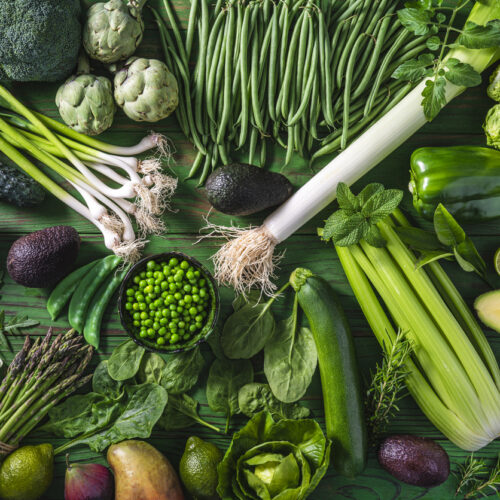
Escape the diet cycle. Dietitian Angela Berrill looks at ways to reach a healthy weight without dieting.
Whether we like it or not, diet culture is still a huge part of society’s perception of health, from #fitspo posts and celebrity-endorsed restrictive eating patterns on social media, to the numerous weight-loss products flooding the market.
For many of us, dieting has been a way of life. We may have grown up seeing family members, friends, classmates or teammates go on ‘diets’ or even tried one (or several) ourselves.
However, while embarking on a diet often starts out with good intentions, it may lead to a vicious dieting cycle, which can end up negatively affecting our health and well-being. We may lose weight in the short term, but we often end up putting it back on again further down the track. Then we blame ourselves for a lack of willpower. But what if willpower has nothing to do with it? What if there’s a way to reach and maintain a healthy weight beyond dieting?
What is the diet cycle?
Most of us are probably familiar with the diet cycle. It starts with wishing to lose weight, so beginning a diet that usually involves dietary restriction, such as cutting out a specific food or foods, or even entire food groups. Weight loss may be achieved initially, however, it is often unsustainable, especially when we break self-imposed rules.
This may result in a ‘slip-up’, where we are left with a sense of failure or guilt. Often the response to these feelings is to ‘feast’ or ‘binge’ to feel good again. While that may feel okay in the moment, feelings of guilt and self-loathing soon set in, often followed by a greater desire to lose weight, hence the diet cycle.
Why doesn’t restriction work?
Dieting and restriction can cause physical, emotional and spiritual distress. According to Emma Thomas, from the New Zealand eating Disorder Clinic, the reason diets don’t work is because they ‘encourage all-or-nothing thinking’, meaning, when a person breaks a diet rule, they ‘are left with a sense of failure and are, therefore, more likely to continue eating in an indulgent way to cope with the guilt and shame’ they are experiencing.
Ms Thomas says because people are either ‘on’ or ‘off’, with no in-between, they swing between deprivation and over-indulgence, which can result in becoming obsessed with food, even after the diet has ended. She believes our strong diet culture makes it easy to feel overwhelmed and hopeless, while continuing to be stuck in the diet cycle. Ms Thomas encourages people to remember ‘it is the restriction you are placing on yourself that is doing the damage’.
One explanation of why willpower doesn’t work is the Ironic Process Theory. When we try to suppress thoughts or behaviours, we start thinking about them more. Without intending to, we may end up succumbing to those feelings.
Ms Thomas agrees. “Labelling foods as ‘bad’ increases their psychological reward value,” she says. “As soon as we ‘can’t’ have something, we want it more.”
Conversely, evidence suggests allowing ourselves to think about an act, such as eating cake, does not lead us to eating it.
Your body fights weight loss
Physically, our bodies are programmed to fight against weight loss. Leptin, the fullness hormone, tells us when to stop eating, whereas ghrelin tells us when we need to eat. Ideally, both of these hormones act together – one is rising while the other is dropping. But, when we lose weight, leptin levels drop and we start to feel hungrier, resulting in us increasing food intake, so regaining weight.
Decreased leptin levels may also explain why those who have lost weight can find it hard to keep it off long-term. Being caught in the diet cycle can also play havoc with ghrelin, causing production to increase, making us feel hungrier and, ultimately, weight is regained.
So how can you reach a healthy weight in a sustainable way?
Experts advise the safe weekly rate of weight loss is between 0.5kg and 1kg, in order to minimise weight regain. Rapid weight loss is not your friend but if you take it slowly your body is more able to cope and adjust.
The meal plans included in our Kick-start Plan feature lower-kilojoule, nourishing and satisfying, vege-loaded meals and snacks. No restricting, starving or cutting out food groups. The plan averages around 6500kJ a day, which will promote slow, achievable weight loss in a woman of about 1.6m height. A man around 1.79m tall might need to increase portions by about one-third for similar weight loss. It’s very much about mixing an matching meals and snacks to get it right for you. Your energy requirements depend on your sex, height and activity level, as well as your current weight, but it’s not recommended you eat any less than in the plan.
The goal is to have a healthy relationship with food as something that that nourishes body and soul, enjoying it in portion sizes that are right for you. Trying to drop the kilos quickly undermines that goal.
How can we stop the diet cycle?
Reframe the goals
Focusing on becoming healthier rather than simply losing weight can be a helpful approach. While, traditionally, health status has been closely entwined with body weight, there is a growing body of literature to support an alternate approach. The non-diet approach moves the focus away from body weight, shape or size and, instead, encourages a fulfilling and meaningful lifestyle, by eating according to internally directed signals of hunger or satiety and engaging in reasonable levels of physical activity for movement and health, rather than to shape the body. When we are motivated by wanting to feel better, build strength and gain more energy, we are less likely to slip into unhelpful behaviour cycles driven by feelings of failure, and, if reaching a healthy weight is a consequence of taking better care of ourselves, that’s a bonus.
Intuitive eating
The term ‘intuitive eating’ was coined by US dietitians Evelyn Tribole and Elyse Resch in the 1990s. The concept encourages people to listen to their internal cues of hunger and fullness (satiety) rather than external you cues, such as meal timing or events. The aim is to eat to satisfy physical hunger without feeling guilt. The key is distinguishing between physical and emotional hunger.
Intuitive eating can help prevent negative body image and disordered eating. The concept of intuitive eating does not have rules to follow, instead offering principles to guide us, including rejecting the diet mentality, responding to hunger, getting rid of value judgements about food, respecting our fullness, enjoying food, honouring feelings without using food, respecting the body, exercising in ways we enjoy and keeping in mind our overall pattern of eating is what shapes our health, rather than individual instances. It acknowledges that we can know what the best foods are to nourish our body. This may mean occasionally we eat cake because it satisfies us, just as eating wholefoods may help us feel energised and well.
Mindful eating
Mindful eating is different from intuitive eating, but they often work together. Mindful eating helps us understand why and how we are eating. The process involves being ‘present’ in the preparation and eating of food. It encourages curiosity and satisfaction around food without judgement, as well as utilising all senses to experience every mouthful, while acknowledging our body’s internal hunger and fullness cues.
Both intuitive and mindful eating help us develop a healthier relationship with food. When we allow ourselves to eat without restriction, while tuning into our hunger cues, and are mindful of why and how we are eating, then we often eat less than we might in a distracted state. The more we listen to our body’s internal cues and drivers, the better we become at choosing nourishing and satisfying food.
8 signs of diet mentality, and how to change your mindset
- Labelling food as ‘good’ or ‘bad’
One of the core issues with diet culture is labelling food as good or bad. All food can be part of a healthy diet. And if we follow this mantra, we cannot ‘fall off the wagon’ by eating something banned. - Cutting out food groups
A diet that requires you to avoid certain foods altogether can be difficult to sustain, antisocial or lack essential nutrients. Be sure to include mostly whole and minimally-processed food, with plenty of colourful vegetables and fruit, some whole grains and legumes, and small amounts of lean meat. If you would like to cut out a food group, it’s important to talk to a dietitian or registered nutritionist to ensure you’re getting all the nutrients you need. - Obsession with, or purposeful avoidance of, weighing yourself
You are more than a number on the scales. Along with ditching the diet, ditch the scales. Instead, focus on how you are feeling, your energy levels, your mood or how rested you are, as signs of your health and wellness. - Relying on willpower and a set of strict food rules
This may get results in the short term, but no amount of willpower can keep you going forever and it will ultimately leave you feeling like a failure. Be flexible about food and enjoy it. Eat when you experience a gentle hunger and stop when you are comfortable, rather than overly full. Take your time, so your body has time to let you know it is full. - Feelings of guilt or shame after eating
Enjoy food without feeling guilt or shame. Focus on food that makes you feel satisfied and nourished. Truly savour every mouthful. - Secret eating or avoidance of social situations
Food is so much more than the nutrients it provides us with. It is also part of social get-togethers and celebrations. By listening intuitively to your body, eating can be pleasurable and something to be embraced. - Eating when you feel stressed, tired or emotional
Food can be comforting in stressful times. By practising mindful and intuitive eating we can become more in tune with the reasons we eat and look for alternative strategies when food isn’t the answer. For example, a packet of biscuits is not going to make you feel less lonely, but talking to a friend might. - Excessive exercising or further dietary restrictions to compensate for ‘slip ups’
When eating without restriction, we remove the desire to compensate or make up for slip ups or ‘indulgences’. By embracing all food through mindful and intuitive eating, we create a positive relationship with food, where there is no need to ‘get back on track’. Exercise because you want to move, rather than to change your body shape or punish yourself. Find a form of exercise you enjoy doing. That way it’ll be much easier to make a habit of it.
Health without willpower
As the Ironic Process Theory explains, the more willpower we try to have, the more likely we are to want the very thing we are trying so desperately to avoid. This, in part, goes some way to explain why willpower doesn’t work when it comes to forming healthy habits. Other factors can also come into play, for instance, the amount, or lack of, sleep you get each night. Have you ever noticed you are hungrier on days when you haven’t slept well? That’s because your ghrelin (that hunger hormone again) levels can spike and leptin levels decrease, making you hungrier and more likely to want something that will give you instant satisfaction.
The good news is there are some simple things you can do to develop healthier behaviours without willpower:
Listen to your body by practising mindful and intuitive eating. If you are hungry, ask yourself what food would make you feel best after eating it, not just while you’re eating it? Are you really hungry or just bored or having difficult feelings? If the latter, try having a glass of water instead and practise a grounding exercise. Make an occasion out of eating. Sit down without distractions and enjoy the texture, smell and flavour of the food. Take your time and tune into how your body feels before, during and after eating.
Add in healthy foods rather than removing food groups. Aim to increase your intake of vegetables and fruit. Include more whole grains. eat fish two or three times a week. Treat lean meat as a garnish rather than the main event. Have a good breakfast that includes protein, such as milk, yoghurt or eggs, so you feel satisfied for longer. Opt for healthy sources of fat, such as nuts, olive oil and avocado. Eat a wide variety of food and challenge yourself to try new things.
Use the ideal plate as your guide. The ideal plate comprises half its volume in non-starchy colourful vegetables, a quarter in carbo-hydrates (including rice, potato, pasta) and a quarter in protein (fish, meat, eggs, tofu, for example).
Make small sustainable changes gradually, rather than large unrealistic changes quickly. Try to introduce one new healthy habit – such as drinking more water, eating more than five vegetable serves a day or changing to grainy bread – every couple of weeks. Once you have achieved one goal, start on the next one. Celebrate your successes with fun, non-food rewards, such as going to the movies or picking or buying yourself some flowers.
Follow loose guidelines instead of strict food rules, and base them on eating a variety of foods, including the occasional treat. Have some chocolate, if that’s your thing, but savour it. Let yourself really enjoy it then move on.
Get enough sleep
Aim for seven to nine hours per night. Try to go to sleep and get up about the same time each day. Keep your room cool, dark and free of devices. Wind down before bed with a bath, a book or some nice music, ideally without screen time. Try to get some sun on your face during the day and aim for at least 20-minutes exercise, three times a week (walking will do). Include low-GI carbohydrates in your evening meal such as legumes, wholemeal pasta, peas or cooled cooked potatoes.
Health is a work in progress
Like most things, we can’t expect our ingrained habits to change overnight. According to Ms Thomas, the generally accepted rule for forming new habits is 21 days. However, she also admits, in reality, this depends on the person and the habit. So, let’s say goodbye to the diet cycle and willpower once and for all, because body size has nothing to do with our willpower or ability to stick to a diet. Neither can it predict a person’s worth. Instead, let’s focus on our physical, mental and emotional well-being rather than numbers on a scale, and aim for a long life of healthier habits that are sustainable and make us feel great.
Grounding exercise
If you are feeling anxiety or other emotions you find difficult, instead of reaching for the chips, try this mindfulness exercise.
1 Take four deep breaths in through the nose and out through the mouth
2 Look around the room and notice all the details of your surroundings. Silently name at least seven things you can see
3 Scan your body and notice at least six sensations you can feel. Are there parts of you that feel heavy or light? Are there areas of tension or relaxation? Which parts of you are making contact with surfaces such as a chair or the floor? Don’t linger or try to change the sensations. Just observe them, name them and keeping scanning
4 Tune in to the sounds in your environment. No need to linger on a particular sound, just name it then move on to the next. See if you can name at least five sounds
5 Try to name two things you can smell, or think of three or four things you like the smell of
6 Name one good thing about yourself or someone or something in your life. Maybe you were kind today, maybe you are funny or maybe your cat makes you feel good.
Article sources and references
- Erskine J & Georgiou G. 2011. Thoughts on suppression. The Psychologist 24:824-7https://thepsychologist.bps.org.uk/volume-24/edition-11/thoughts-suppression
- Erskine J & Georgiou G. 2010. Effects of thought suppression on eating behaviour in restrained and non-restrained eaters. Appetite 54:499-503https://www.ncbi.nlm.nih.gov/pubmed/20152872
- Fothergill E et al. 2016. Persistent metabolic adaptation 6 years after ‘The Biggest Loser’ competition. Obesity 24:1612-9https://www.ncbi.nlm.nih.gov/pubmed/27136388
- Health Navigator. How much sleep is enough, healthnavigator.org.nz Accessed July 2018https://www.healthnavigator.org.nz/healthy-living/sleep/how-much-sleep-is-enough/
- Miller WC. 1999. Fitness and fatness in relation to health: implications for a paradigm shift. Journal of Social Issues 55:207-19https://spssi.onlinelibrary.wiley.com/action/doSearch?AllField=Fitness+and+fatness+in+relation+to+healtH&SeriesKey=15404560
- NHLBI Health Topics. 2014. Overweight and obesity, ncbi.nlm.nih.gov Accessed July 2018https://www.nhlbi.nih.gov/health-topics/overweight-and-obesity
- NHS Choices. 2016. Should you lose weight fast? nhs.uk July Accessed July 2018https://www.nhs.uk/live-well/healthy-weight/should-you-lose-weight-fast/
- Outland L. 2010. Intuitive eating: A holistic approach to weight control. Holistic Nursing Practice 24:35-43https://www.ncbi.nlm.nih.gov/pubmed/20023522
- The Original Intuitive Eating Pros. Creating a healthy relationship with food, mind and body, intuitiveeating.org Accessed July 2018https://www.intuitiveeating.org/10-principles-of-intuitive-eating/
- Wegner DM et al. 1987. Paradoxical effects of thought suppression. Journal of Personality and Social Psychology 53:5-13https://www.ncbi.nlm.nih.gov/pubmed/3612492
www.healthyfood.com










